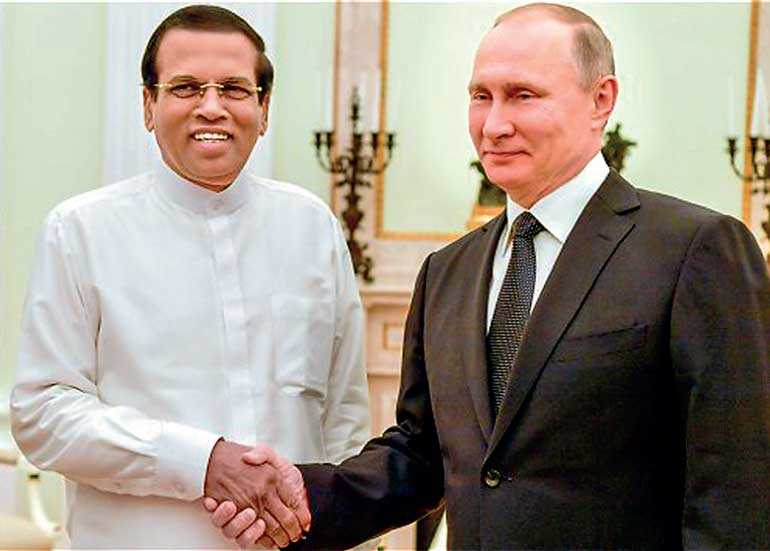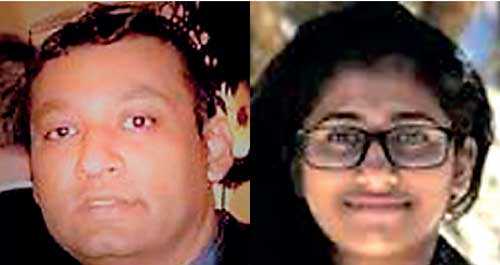Tuesday Feb 24, 2026
Tuesday Feb 24, 2026
Tuesday, 24 September 2019 00:32 - - {{hitsCtrl.values.hits}}

Since President Vladimir Putin assumed presidency, Russia has been even more consistent in its foreign policy towards Sri Lanka than before
By Srimal Fernando and Yashodha Rathnayake
Six decades of diplomacy between Russia and Sri Lanka have yielded solid accomplishments in preserving the long-standing partnership. It is found that Russia’s foreign policy approach concerning Sri Lanka has played a firm role in turning a new chapter in each other’s diplomatic practices. Today, evidence of this is noticeable in the closeness between Moscow and Colombo. In most recent times, the time-tested, deep-rooted friendship was clearly demonstrated when Russian President Putin said “Moscow remains a reliable partner of Sri Lanka” following the Easter Sunday bombings.
At other times, Russia pursing the neutralisation of diplomatic pressure against Sri Lanka, especially in the United Nations Security Council (UNSC), were favourable policy measures in preventing sanctions on the island nation. If one adds to all this, the current diplomatic concerns are of great importance for both economies. As figures show, Sri Lanka has thus far been able to sell over 140,000 metric tons of tea worth $430 million per year to Russia (World Tea news 2017). 
Another possibility is dependency on the Russian tourism market. It is important to note that there were and still are 64,000 Russian tourists visiting Sri Lanka. Currently, Rossiya Airlines, a member airline of the Russian national carrier Aeroflot, resumed direct flights between the two capitals. From a defence point of view, Russian General Gerasimov memorably stated, “Sri Lanka is Russia’s reliable partner in South Asia. We have very good relations established over the 60 years of development of our contacts’ ensures that more Russia is a true friend of Sri Lanka.” In other words, Russia is strongly inclined to have a specific, geo-politically important relationship with Sri Lanka.
The above reasons and the message show why Sri Lanka and Russia are still interdependent on each other. Historically, Russian diplomatic engagement with Sri Lanka goes well beyond official diplomatic records to the beginning of the twentieth century, when the Russian Crown Prince Nikolai II visited Ceylon. At the end of World War II, the Soviet Union (USSR) quickly turned to Colombo due to the polarisation of global forces.
The first major step towards the beginning of full bilateral ties between the Soviet Union and Ceylon was in 1956 under the patronage of Prime Minister S.W.R.D. Bandaranaike. Later, in the mid-sixties when Sirimavo Bandaranaike won the elections and became Prime Minister, many believed that the new administration would share a socialist ideology. However, the world’s first woman premier’s foreign policy was guided by the principles of the Non-Aligned Movement (NAM). During this era, the Soviet Union was instrumental in transforming the agriculture-based economy into a competitive manufacturing nation through her technical co-operation. Setting up Ceylon Steel, Tyre and Sugar Corporations with the support of the USSR created employment opportunities that notably improved manufacturing efficiency.
Over the years, the USSR provided adequate facilities for many Sri Lankan students to pursue their higher education. The statistics speak for themselves, and clearly shows that more than 3,000 Sri Lankans obtained their degrees in various universities in Russia and in the Commonwealth of Independent States (CIS).
After the fall of the Soviet Union these bilateral ties were tested, yet Russia kept a close watch on the South Asian island nation until they were revived to their old glory. In the last fifteen years, since President Vladimir Putin assumed presidency, Russia has been even more consistent in its foreign policy towards Sri Lanka than before. Believing in the true principles of diplomacy, Russia and Sri Lanka have crafted a grand strategy based on the Non-Aligned Movement (NAM) principles and old Soviet connections. Thus looking back, one can claim the whole diplomatic process to be exceptionally satisfactory.
Obviously, comparing then and now, it is vital that steps are taken to ensure the free flow of foreign policy ideas to reshape external policy outreach. Whether the momentum of these ideas can be implemented is another matter. For a small nation like Sri Lanka, it is important to define a new balance between external outreach and internal stability. For example, tapping into Russian billionaires might help Sri Lanka to attract Foreign Direct Investment (FDI) opportunities. For Russia, the geographical position of Sri Lanka is an advantage for accessing the 1.3 billion Indian consumer market through the Indo-Lanka Free Trade Agreement (ISFTA). Now these ideas have a chance in becoming instrumental to putting those words into action through two-way trade.
Throughout their diplomatic history, both sides knew to keep their faith alive. In this regard, the collaboration between Moscow and Colombo seems well on the way to successful co-operation in the coming years.
Srimal Fernando is a Doctoral Fellow at Jindal School of International Affairs (JSIA), India and a Global Editor of Diplomatic Society for South Africa. He won the 2018/2019 Best Journalist of the Year Award in South Africa.
Yashodha Jayathmi Rathnayake is a Bachelor of Arts English (Honours) scholar at the Faculty of Social Sciences and Languages, Sabaragamuwa University of Sri Lanka.